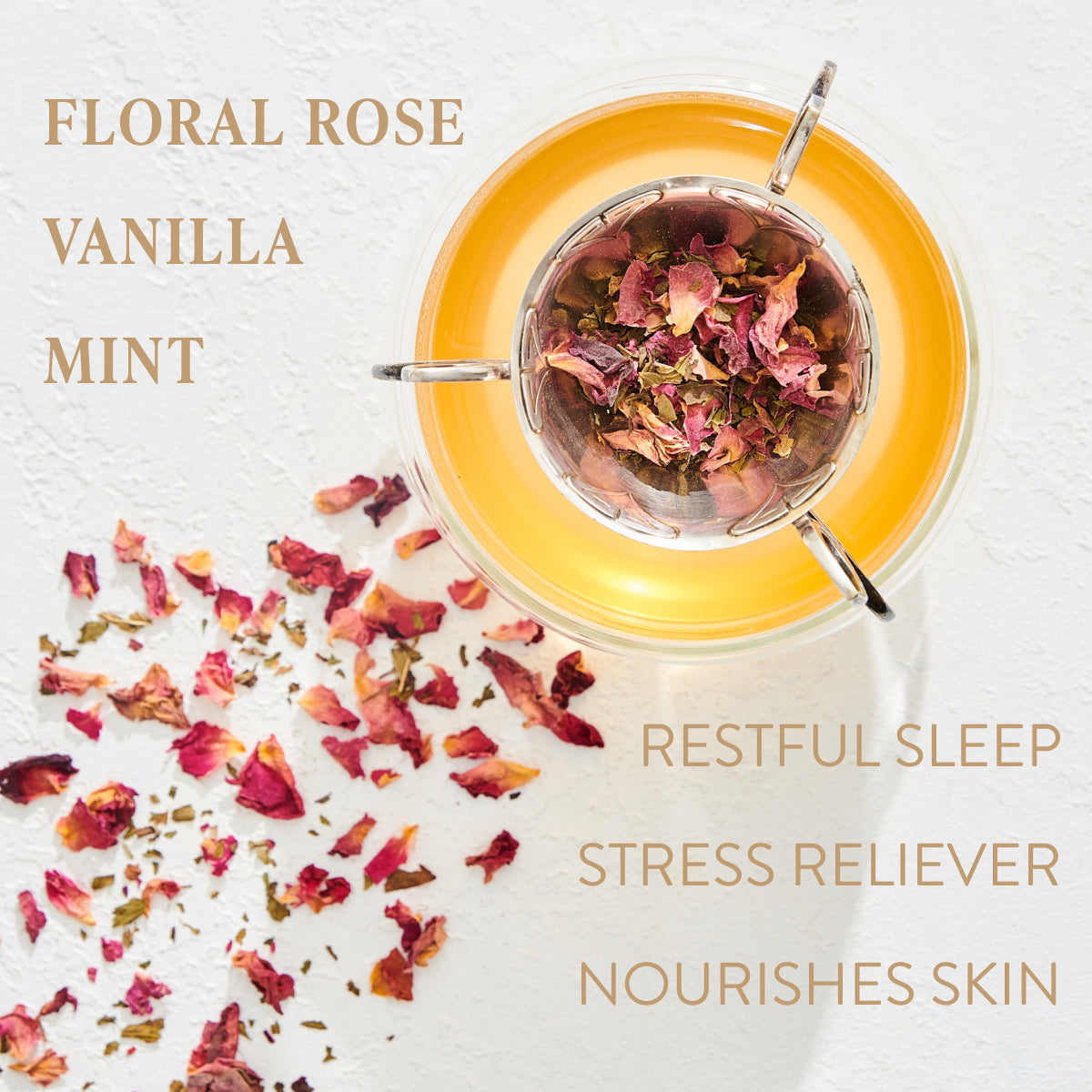Peppermint tea is the second-most popular herbal tea on the market. Soothing and refreshing, peppermint tea offers comfort in every cup.
If peppermint is one of your favorite flavor profiles, you’ll be pleased to know it has many health benefits.
In this guide, we’ll look at 6 incredible peppermint tea benefits, starting with how to brew the perfect cup.
How to Prepare Peppermint Tea

There are several ways you can make peppermint tea.
- Peppermint tea bag: For a single cup of peppermint tea made with a tea bag, bring your water to just under boiling, about 200°F. Steep your tea to taste, usually 3–5 minutes. The longer the brew, the stronger the tea will be. Remove the tea bag. Add a spoonful of honey for sweetness, or enjoy plain.
- Peppermint Loose Leaf: Loose-leaf peppermint tea is made similarly. The primary difference is in the measuring and straining of your tea leaves. For loose-leaf tea, measure 1 teaspoon of tea per 8 ounces of water. Place the leaves in a strainer or infuser, or use a tea strainer like this gorgeous gold leaf tea strainer from Magic Hour.
- Tea Pot: If you opt to make a pot of peppermint tea as opposed to a single cup, the same steps apply. Use 1 tea bag for a mild pot of tea and 2 for a stronger infusion. For loose leaves, strain your tea into the pot or purchase a teapot with a built-in infuser, like this hand-blown glass teapot.
6 Health Benefits of Peppermint Tea
Peppermint tea doesn’t just refresh and delight. It also has a host of health benefits you may not be aware of. We’ve highlighted the best here.
Improved Digestion and Reduced Stomach Upset
Peppermint is lauded for its calming effects, and for good reason. Peppermint improves digestion, soothes stomach aches, eases constipation, and relieves abdominal pain and bloating.
Digestive discomfort typically passes within a few hours, but you can be very uncomfortable in the meantime. Peppermint tea prevents your muscles from contracting, causing the spasming discomfort to cease.
Peppermint tea can be particularly useful in soothing irritable bowel syndrome (IBS) symptoms and menstrual cramps.
The next time you are experiencing discomfort in your tummy, put the kettle on and make yourself a cup of peppermint tea.
Sinus Congestion Relief
The menthol in peppermint tea is a natural decongestant, helping to thin mucus and open up nasal passages.
Its anti-inflammatory and antibacterial properties also reduce swelling and alleviate pressure and pain.
If you suffer from sinus congestion, peppermint can help with these methods:
- Inhaling steam: Brew a pot of peppermint tea and place a towel over your head to create a tent. Inhale the steam deeply into the enclosure.
- Hot compress: Brew two peppermint tea bags. Bring them out of the water and let them cool. Place the warm, damp tea bags over your sinuses (across the bridge of your nose and above your cheeks) for about 10–15 minutes.
- Gargling: Brew a cup of peppermint tea and let it cool to a comfortable temperature. Gargle with the tea for 30 seconds to a minute, then spit it out. Repeat as needed.
Fewer Headaches and Migraines
Headaches and migraines can come on randomly, or you may suffer from chronic migraines. Regardless of the specific cause of your pain, a cup of peppermint tea can help soothe your symptoms. This is thanks to the properties of peppermint as a pain reliever and muscle relaxant.
The menthol that can be found in peppermint oil helps to increase blood flow, which can provide relief during a headache. Peppermint oil applied directly to the forehead can also help soothe your discomfort.
Enhanced Cognition
The National Institute of Health published a study showing that merely sniffing peppermint oil protects brain nerves from oxidative damage.
A further study found that drinking peppermint tea significantly increases alertness and long-term memory.
Alleviate Menstrual Discomfort
A 2016 clinical trial found that peppermint oil capsules reduced the intensity and duration of menstrual pain and associated symptoms like nausea and diarrhea.
Non-steroidal anti-inflammatory drugs (NSAIDs) such as Ibuprofen and Aspirin are also effective but can cause unwanted side effects.
Among these are:
- Raised liver enzymes
- High blood pressure
- Intestinal bleeding
- Heartburn
- Dizziness
Comparatively, peppermint’s side effects are much less dangerous and tend to be mild. However, they also include some dizziness and heartburn.
Fresher Breath
If you suffer from bad breath or are worried about it, peppermint can help. Peppermint is the most common flavor in toothpaste and breath mints because it works. Peppermint is packed with antibacterial properties that kill germs and keep your breath clean and fresh.
Potential Side Effects of Peppermint Tea
Despite its amazing benefits, frequent use of peppermint can cause discomfort for some. Here are some common side effects of peppermint tea for you to consider.
Heartburn
While peppermint tea improves upset stomach and nausea, it can exacerbate heartburn and acid reflux, especially in those who may already struggle with excess acid.
Because peppermint relaxes the sphincter between the stomach and esophagus, it allows for stomach acid to flow back up into the esophagus. Be mindful of this if acid reflux is a problem for you.
Medication Interactions
Peppermint tea does interact with some medications. Peppermint should be avoided if you take:
- Blood pressure medication
- Muscle relaxants
- Cyclosporine
- Antacids
Always speak to your doctor or pharmacist if you have concerns about how peppermint tea may interact with your medications.
Magic Hour Favorites: Peppermint Tea

Peppermint tea is magic in a cup. If you’re ready to dive into the magnificent benefits that peppermint tea offers, start with our collection of premium, organic peppermint teas.
Peppermint Tea FAQ
Can I drink peppermint tea every day?
Yes, daily consumption is safe. If you start to experience side effects, stop and talk to your doctor.
Who should not take peppermint tea?
If you suffer from acid reflux or are on certain medications, you should avoid peppermint tea. Always consult your doctor when in doubt or for medical concerns.
Does peppermint tea make you sleepy?
Peppermint tea causes muscle relaxation and calmness, which may aid sleep in some people. However, studies have shown that peppermint tea most often causes more alertness. For sleep, chamomile tea is the better option.
Does peppermint tea have any nutritional value?
Peppermint tea contains trace amounts of vitamins A and C, as well as antioxidants and anti-inflammatory properties.
How long does it take for peppermint tea to work?
Most benefits of peppermint tea will become active in 30-60 minutes.










